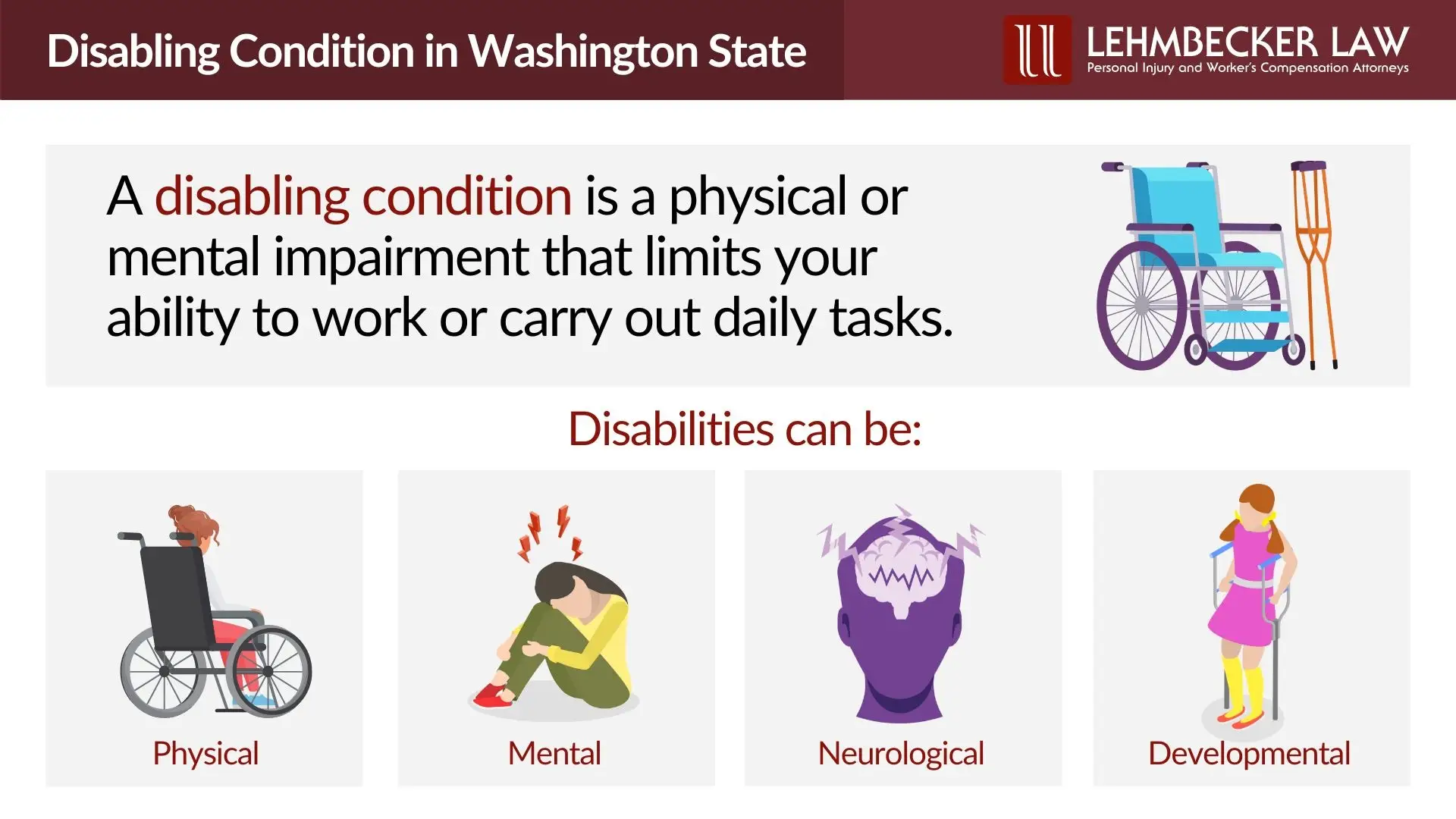There is no fee unless we win!
EN

- EN
- ES


If an injury, illness, or ongoing health issue has made it difficult — or impossible — for you to work or manage daily life, you might have what’s legally recognized as a disabling condition, something that now prevents you from working, living comfortably, or maintaining your daily routine.
Whether it stems from a workplace accident, car crash, or serious slip and fall, understanding your rights is the first step toward getting the compensation you need. In this guide, we’ll break down exactly what a disabling condition is, explore examples that may qualify under Washington State and federal law. If you believe you have a qualifying condition, be sure to contact our skilled personal injury lawyers in Washington who can help you get through this challenging time.

A disabling condition is any mental, physical, or sensory impairment that limits your ability to perform essential life tasks or hold steady employment. In legal terms:
In short: If your condition limits what you can do — physically, mentally, or emotionally — and impacts your ability to work, you may qualify for support.
Disabling conditions can take many forms. Some are visible; others are invisible but just as serious. Here are several categories of disabilities:
Some people live with multiple overlapping conditions. For example, someone with a brain injury may also experience low vision and difficulty concentrating. Each individual’s experience is unique.
A disabling condition can happen suddenly or develop over time. Common causes include:
Sometimes, symptoms don’t show up right away. A person involved in a car crash may feel fine at first but later develop chronic back pain or cognitive issues. That’s why it’s critical to stay aware of your health and seek legal advice if new symptoms start to interfere with your life.
Whether your condition resulted from a workplace accident, a car crash, or medical negligence, the steps you take early on can make a big difference in your ability to receive compensation.
Here’s what to focus on:
Working with an experienced injury attorney can make a major difference. Even if your accident happened months ago, symptoms like cognitive impairments, hearing loss, or anxiety might still emerge. Don’t ignore them — talk to a lawyer who understands how these conditions unfold.

If you’ve developed a disabling condition due to an accident, workplace injury, or medical negligence, you may be entitled to compensation, but the process depends on how and where your injury occurred.
Here are the most common paths to benefits:
If you've suffered a disabling condition due to someone’s negligent actions, you may be entitled to both economic and non-economic damages. These are meant to cover immediate losses as well as the long-term impact of your injury.

In Washington State, disability compensation can be provided by several entities, depending on the nature and cause of the disability:
This is the exclusive state-run workers' compensation insurance program in Washington. If you are injured or develop an occupational disease while on the job and your employer is covered by the State Fund, L&I provides benefits such as medical expense coverage, time-loss compensation (a portion of lost wages), loss of earning power benefits, vocational rehabilitation, and permanent partial disability awards. For severe, life-threatening injuries that prevent a return to gainful employment, L&I may also award a lifelong disability pension.
Some employers in Washington opt to self-insure their workers' compensation obligations instead of participating in the L&I State Fund. While overseen by L&I, these employers directly manage and pay out benefits to their injured workers, including medical costs, lost wages, and other compensation.
The U.S. Department of Veterans Affairs provides tax-free monthly disability compensation to veterans who sustained an illness or injury, or had an existing condition aggravated, during their active military service or training. The amount of compensation depends on the severity of the service-connected disability, determined by a VA disability rating.
The VA also offers Special Monthly Compensation (SMC) for certain severe disabilities or aid and attendance needs, and Dependency and Indemnity Compensation (DIC) for survivors of veterans who died from service-connected disabilities.
To qualify for SSDI, you must have a disability or blindness that prevents you from working for at least a year or is expected to result in death. If you continue to work, your earnings must remain below a specified "substantial gainful activity" (SGA) limit (for 2025, $1,620/month, or $2,700 if blind).
Additionally, you generally need to have sufficient work history, typically meaning you've worked for at least 5 of the last 10 years, though requirements may differ for younger individuals. Your benefits may include a monthly payment, with the amount based on your prior work history, and potentially Medicare.
Living with a disabling condition can be challenging — physically, emotionally, and financially. Whether you’re dealing with chronic pain, a traumatic brain injury, or long-term complications from surgery or childbirth, we’re here to help you fight for the benefits you deserve.
At Lehmbecker Law, we understand how these conditions impact your ability to work and live fully. We will help you by providing a free case evaluation to determine whether you are eligible for compensation and can file a claim.
Our team is here to listen, guide you through the claims process, and help you pursue the benefits you're entitled to. It starts with a conversation, and it costs nothing to find out where you stand.

You don’t have to go through this alone. Whether your symptoms are physical, mental, or both, we’ll help you determine your best course of action to help you get the compensation you deserve.